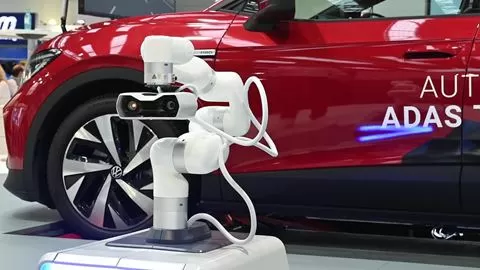The automotive industry has been a cornerstone of modern society for over a century, providing us with the means to travel and connect with the world around us. However, in recent years, the industry has been undergoing a profound transformation, driven by technological advancements and changing consumer demands. From the rise of e-mobility to the increasing digitalization and integration of artificial intelligence, the automotive industry is evolving at an unprecedented pace. This transformation is not only reshaping the way we think about transportation, but it is also paving the way for a more sustainable and connected future.
One of the most significant changes in the automotive industry is the shift towards e-mobility. With the increasing concern for the environment and the depletion of fossil fuels, electric vehicles have emerged as a viable alternative to traditional gasoline-powered cars. The demand for electric vehicles has been steadily rising, with major automakers investing heavily in research and development to bring more affordable and efficient models to the market. This shift towards e-mobility is not only reducing our carbon footprint but also promoting a cleaner and greener future for generations to come.
The rise of e-mobility is also driving the need for increased digitalization in the automotive industry. With electric vehicles being equipped with advanced technology and connectivity features, the industry is becoming more reliant on digital systems. From self-driving capabilities to real-time data analysis, digitalization is transforming the way we interact with our vehicles. This not only enhances the driving experience but also improves safety and efficiency on the road. Moreover, digitalization is also streamlining the manufacturing process, making it more cost-effective and sustainable.
Artificial intelligence (AI) is another game-changing technology that is revolutionizing the automotive industry. With the integration of AI, vehicles are becoming smarter and more autonomous. From self-parking to predictive maintenance, AI is enhancing the capabilities of vehicles and making them more efficient and reliable. This technology is also being used to develop advanced driver assistance systems, which are crucial for achieving the goal of fully autonomous vehicles. With AI, the automotive industry is taking a giant leap towards a safer and more efficient future.
The rise of e-mobility, digitalization, and AI has also paved the way for the development of new and innovative mobility solutions. The concept of shared mobility, where individuals can access transportation services on-demand, is gaining popularity. This not only reduces the number of vehicles on the road but also promotes a more sustainable and efficient use of resources. Moreover, the integration of AI and digitalization in these services is making them more convenient and user-friendly. This shift towards shared mobility is not only transforming the automotive industry but also changing the way we think about transportation.
The transformation of the automotive industry is not limited to technological advancements; it also includes a shift in consumer demands and expectations. Today’s consumers are more conscious about the impact of their choices on the environment and society. As a result, they are demanding more sustainable and eco-friendly options from automakers. This has led to the development of electric and hybrid vehicles, as well as the use of sustainable materials in car manufacturing. Moreover, consumers are also looking for vehicles that offer advanced technology and connectivity features, making digitalization and AI crucial for automakers to stay competitive in the market.
The transformation of the automotive industry is not without its challenges. The shift towards e-mobility and the development of new technologies require significant investments and changes in infrastructure. Moreover, the industry also faces regulatory challenges and concerns about data privacy and security. However, these challenges are being addressed by automakers and governments, who are working together to create a more sustainable and connected future.
In conclusion, the automotive industry is undergoing a profound transformation, driven by e-mobility, digitalization, AI, and changing consumer demands. This transformation is not only reshaping the industry but also paving the way for a more sustainable and connected future. With the development of new technologies and innovative mobility solutions, the automotive industry is taking a giant leap towards a cleaner, safer, and more efficient tomorrow. As we continue to witness the evolution of the automotive industry, one thing is certain – the future of transportation is bright, and the possibilities are endless.

